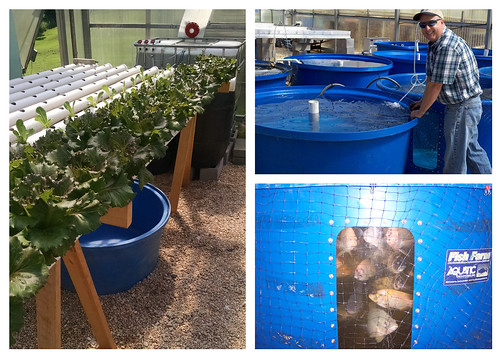
Virginia State University used a NIFA grant to purchase facilities where they teach aquaponics and urban farming. The operation allows them to both raise fish and grow vegetables in a symbiotic environment. (iStock image)
Money’s tight in Petersburg, Va., and sometimes it’s difficult to put nutritious food on the table. Like many other cities in America, Petersburg has found its way onto USDA’s list of food deserts – meaning that residents have limited access to fresh, healthy, and affordable food.
Virginia State University has found a way to fill the void with a hands-on program that teaches students how to successfully sustain urban farming operations and helps put affordable nutritious food on the tables of community residents.
With the help of a $915,000 grant from the U.S. Department of Agriculture’s National Institute of Food and Agriculture (NIFA), VSU Cooperative Extension purchased a large empty downtown warehouse and converted it into an aquaponics production center.
Aquaponics is the combination of raising fish (aquaculture) and growing plants without dirt (hydroponics) in nutrient-rich water. Within their 52,000-square foot downtown warehouse, VSU has created an indoor urban farm that produces vegetables, herbs, and protein year-round and with a minimal environmental footprint.
How this process comes together is simple. First, fish (tilapia and trout) are raised in tanks. Water from the fish tanks is then routed to trays that contain vegetable seedlings, such as tomatoes and lettuce. As the water passes around the roots, the plants absorb nutrients from the fish waste. The water then passes through a filtration process before returning to the fish tank. It’s a continuous cycle that benefits both fish and plant, uses less water, and expends less waste into the environment. Low-energy LED greenhouse lighting makes it possible to grow plants throughout the year.
In addition to the operations center, research facilities, laboratories, and classrooms, VSU’s warehouse has an in-house produce market and loading dock for trucks to take the harvest into the community.
“This is primarily a research facility, but we will have fresh food available,” said Dr. Marcus Comer, project director. “We’ll cart it up in mobile units, like the old ice cream man, and take food to the neighborhoods.”
While bringing food to people who have limited access is important, teaching them to how grow their even more so, said Duron Chavis, VSU indoor urban farm director. “It’s essential for any solution to food deserts to not be paternalistic, in the sense that you don’t just come in a drop food off, because that’s not sustainable.”
NIFA invests in and advances agricultural research, education, and extension and seeks to make transformative discoveries that solve societal challenges.
No comments:
Post a Comment
Note: Only a member of this blog may post a comment.